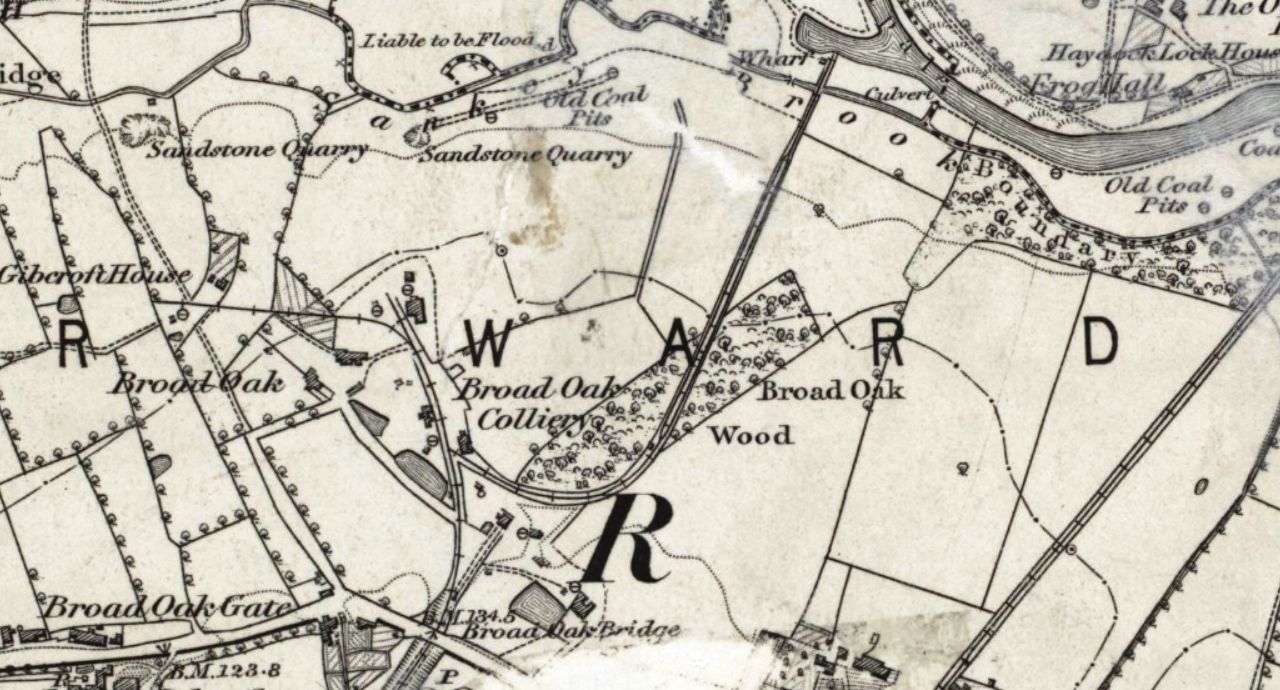Broad Oak Colliery was located off Broad Oak Lane, St Helens on the site of what is now Moorfoot Road Industrial Estate.
It was reported in the Colliery Guardian on 9th October 1858 that the state of trade had become so bad in the town that the owners were intending to reduce the collier’s wages by ten per cent and the Broad Oak Colliery had stopped work. A Committee had been appointed to go round and collect subscriptions for a strike so that each man could receive 10/- a week. It was reported that their conduct was peaceable and there had been no demonstrations. The owners had large stocks of coal and could hold out as winter approached.
The pit was at a standstill and there was no agreement between men and masters. At the start of the week, the masters had sent to the North to get men who would work on reduced wages. By 30th October the strike was brought to an end on the favour of the colliers. The owners had offered to make the reduction 5 per cent, not ten per cent but the colliers would not accept this. The owners gave in and it was the first time that the colliers had won a dispute like this in St. Helens. The £3000 that had been collected for the strike fund was distributed. By 13th November it was reported that the trade was looking good and all the pits were working and no colliers were idle.
However, all was not good and the colliery closed the following year with the plant and effects being advertised for sale by auction in the Warrington Gazette on the 22nd and 29th October 1859.
‘Important Sale of Valuable ENGINES, Pumping Engine, Wrought Iron Boilers, Coal Waggons, Pump Trees, Brass Working Barrels, Oil Brass, Walker’s Patent Riddles, Wrought Iron Bar Rails, Fishbellied Rails, and other effects, at Broad Oak Colliery, Parr, near St. Helens, Lancashire.
ROBERT BUTLER, respectfully announces that he has been favoured with instructions, from Messrs. Bournes, Coal Proprietors, of St. Helens, to SELL BY AUCTION, in lots, on Wednesday. the 2nd day of November next, at Eleven o clock the forenoon, at the Broad Oak Colliery, Parr, Lancashire, the whole of the extensive and very valuable colliery plant; including one condensing low-pressure beam bright-polished pumping engine, by Hick of Bolton, cylinder 66 inches bore and 9 feet stroke, with head gearings and tappet motion, on the newest improvement, all nearly new, with steam pipe and boiler connections, cast iron gallery stairs, palisading, and hand rails, on the most modern constructon, with crab and chains to lift cover, and outside gallery of pitch pine; three waggon-shaped wrought iron boilers, 23 feet 6 Inches long, 6 feet diameter, with manholes and covers, fire doors, dead plates, bearers, dampers, frames and bars; one 15-horse condensing beam Engine, with fly-wheel, spur-wheel, and winding gearing, capable of being converted into a high-pressure engine, with steam and feed pipes, &c., complete; one 15-horse ditto; one 3-horse high-pressure vertical Engine, with bed plate, steam pipes, &c., complete, suitable for churning or thrashing machine; one 4-horse Engine, with fly-wheel and wrought iron shafts, steam pipes, &c., complete; one 70-horse horizontal high-pressure winding Engine, with wrought iron shafts, fly wheel 16 feet diameter, with brakes and two verticals, 5 feet stroke, with steam and exhaust pipes, Daglish, of St. Helens; one 40-horse high-pressure vertical winding Engine, Daglish, of St. Helens, with wrought iron shaft, fly-wheel 16 feet diameter, with brake and two verticals, &c., five wrought iron egg-ended boilers, 24 feet long, 5 feet 6 inches diameter, with fire doors, frames and bars, change boxes, steam and feed pipes, safetv valves, and water gauges; one 2-horse winding Engine, with 4 feet stroke, stands upon foundation plate, with four columns and entablature, 14 feet fly-wheel, &c.; three of Walker’s patent riddles and gearings, large quantity of steam and exhaust pipes; two wrought iron round boilers, 16 feet long by 5 feet diameter, with fire doors, &c., ….. 420 yards length of flat wire rope, 3 1/2 inches broad and 5/8 inch thick (new in 1859); two oak capstans, with long beams and pulleys; …..one 12-ton Weighing machine, by Daglish, St. Helens.
REFERENCES
Colliery Guardian 9th October 1858
Warrington Gazette 22nd October 1859 & 29th October 1859

OS Map, Lancashire CI 1846
Reproduced by permission of the National Library of Scotland

